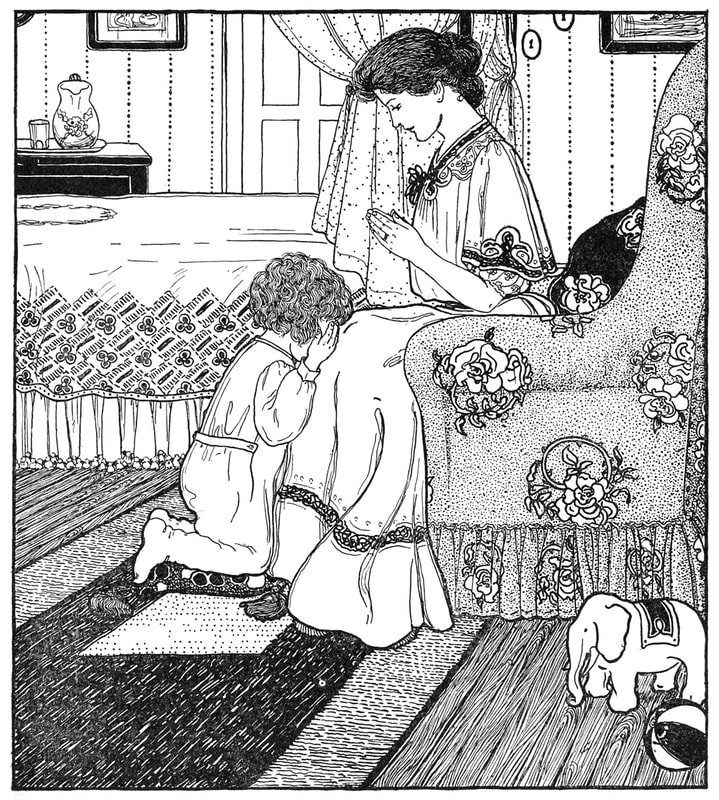
Children, if you are blessed with good parents who give you a good example there is no better means of training you to become good Catholic men and women. Good example is the best teacher of good morals.
The unbounded confidence which you have in your parents, makes you consider everything they do as right and good. If you see that your parents pray devoutly, diligently visit the church, and if their daily conduct shows that they have the fear of God before their eyes, it will make a salutary impression upon you ; that which is good will take root in the hearts of the children of such parents and will become almost a second nature. And when you, young folks, grow up, when severe and dangerous trials have to be endured, you will have become so confirmed in virtue, that sin will not overcome you. And even if you should fall, you will soon rise; your wounded conscience will give you no rest, but will urge and impel you to reconcile yourselves with God as soon as possible.
The Prophet Ezechiel speaks of a wagon drawn by four living beings; as these moved along, the wheels of the wagon turned round and followed. By this wagon we can understand a family; the beings that draw the wagon are the parents ; but the wheels are the children. Now, just as the wheels turned around and went the same direction as the beings that drew the wagon, so children act according to the example of their parents. St. Chrysostom says : "The works of the parents are books from which the children learn. The tongue, the lips of the parents, are as so many books, from which children are taught."
There lived about the middle of the thirteenth century, in Brittany, a pious married couple. God blessed their union by giving them a son, whom they called Yves, and whom they resolved to bring up in piety and the knowledge of God's holy law. The mother especially watched over him, and ceased not to say to him, over and over again : "Yves, you must be a saint." The child, hearing these words so often, said to her one day: "Mother, what is a saint?" "A saint, my child, is one whom God has made to be forever with Him in heaven. A saint is one who loves God above all things, and His Son Jesus Christ : one who keeps all the commandments of God, that he may be with Jesus Christ in heaven." The child listened to these lessons of his mother with his hands joined, and his eyes fixed on hers, eager for every word she said, andwhen she had ended he would say to her : "My mother, I must be a saint; I will love God with all my heart, and all my lifetime I will try to please Him." His father then would say: "My child, your mother has taught you how to love God, I will teach you now how to love your neighbor for God's sake." And he took his little boy on errands of charity and showed him those outward deeds of virtue that mark the Christian among men, and make him glorify His Father who is in heaven. And thus the child grew up a saint.
We read in the Bible that Tobias led a blameless and holy life in the midst of a godless, vicious city. He did this because he was so fortunate as to have a father who not only instructed him in every virtue, but also gave him a most beautiful example. How was it that Timothy lived so piously that St. Paul states that he had found a disciple who was entirely of his own disposition, and who interested himself in the welfare of the faithful as zealously as himself?
The Apostle traces the source to the disciple's mother and grandmother. What kind of parents have as a rule good children? To whom belong those boys and girls who are distinguished for modesty, obedience, fervor in prayer, and fear of God ? Who are those young men and women, who by their reserve and modesty are models for the entire congregation? They are usually the children of good Catholic parents. Since those young people see and hear nothing at home but what is good, they themselves become good, and justify in their parents the hope that they will always remain so. Yes, the lessons and admonitions of parents sink deeply into the hearts of children. They resemble a gentle rain, which moistens ' the soil and causes a plentiful supply of fruit.
There was once a pious mother who had a son whom she taught to love God. From his earliest years he followed the holy counsels she gave him, and grew up a model to all the young men around him. He went frequently to the Sacraments, and there was every appearance that he would live and die a saint. Things went on in this hopeful way till he had reached his seventeenth year. All at once a change came over him. His piety seemed to melt slowly away, and he no longer went to the Sacraments as he used to do. This change in his conduct was soon observed by his good mother. For a long time she tried very hard to find out what was the cause of this change. He never went with bad companions, and she never saw him read bad books. One day when she was more sorrowful than ever she went to see him in his room. "My dear child," she said to him, "you must tell me what is the cause of the great change that I observe in you ; you are not the same pious boy that you used to be. You must tell me all about it." But the son did not speak. He hung his head, and his face grew crimson with shame. His mother became more and more alarmed, and she pressed him with the most endearing words. "My mother," he began, "since you have asked me in this way, I will not hide anything from you; I will tell you all. I loved my religion dearly and I found my greatest delight in the practice of it. But now I have grown up, and I have begun to reflect. Look at my father; see how the world honors and esteems him. Oh, how much I would like to resemble him ! Yet he does not practice his religion. Surely I cannot do wrong in acting as he does. Now, my dearest mother, I have told you all." The poor afflicted mother left her son, and flew at once to the room where her husband was. She sat down by his side, and in the midst of tears and sobs, told him all that her son had said to her. "Come with me," he said, "I have misled my boy, but I may yet save him." Saying these words he went down to his son's room. "My child," he said, "it is indeed a hard thing for a father to go on his knees to his own son, but I will do it. Yes, my child, I am guilty—guilty of a great sin. I have not lost my faith. It is that cursed human respect that kept me from professing my faith openly. Thanks be to God, it is not too late. Forgive me, my dear child, for the bad example. Who is your confessor, he shall also be mine."
The best person if he has bad example before him is in great danger to lose his good principles. This is very true of children who like to imitate what they see and hear, without knowing the consequences of sin. In their simplicity they think that everything done by their parents is good and lawful. As the youth, so the man. The result is that such children often live and die in sin and perish eternally. As long as David himself was pious, his children were the same. But when the father sinned grievously, the children also departed from the right path, and committed heinous crimes.
My dear boys and girls, thank God from the bottom of your heart if you have good Catholic parent? parents who give you a good example. Oh that every Christian mother would ever remember the great influence her example has upon her children for good or for evil, so that she may forever enforce her instruction by her own good example.
Source: Story Sermonettes for the Children's Mass, Imprimatur 1921



 RSS Feed
RSS Feed